Today's teampublished at 19:45 BST 27 August 2020
Today's live coverage was edited by Sean Fanning and Lauren Turner, and written by Ashitha Nagesh, Becky Morton, Paul Kirby, Penny Spiller and Victoria Lindrea.
A third of world's children denied access to remote learning, Unicef says
Masks to be worn everywhere in Paris amid 'undeniable surge' in France
Travellers from Switzerland, Jamaica and the Czech Republic will have to quarantine on arrival to UK
South Korea registers 441 new infections - biggest one-day rise in cases
Remote tribe in India's Andamans archipelago records first cases of coronavirus
More than 24m cases registered worldwide so far, and over 825,700 deaths - Johns Hopkins University
Edited by Lauren Turner
Today's live coverage was edited by Sean Fanning and Lauren Turner, and written by Ashitha Nagesh, Becky Morton, Paul Kirby, Penny Spiller and Victoria Lindrea.
That's it for our live coverage for today. If you're just catching up with the headlines, here's a taste of what's been going on around the UK.
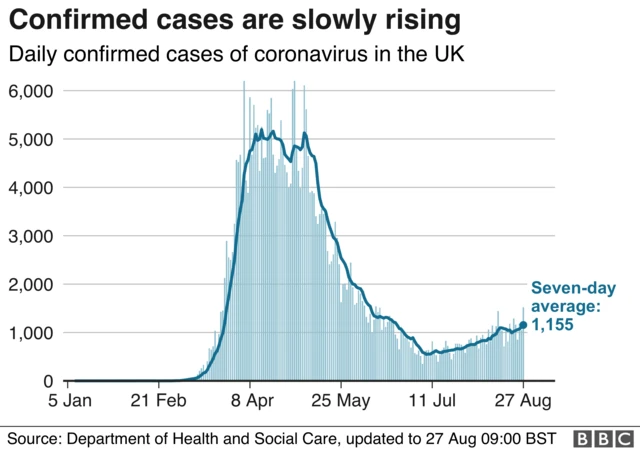
Cases of coronavirus in the UK are on the rise
We'll be bringing this live page to a close shortly.
Thank you for following our coverage of the latest developments in the coronavirus pandemic from around the world. They include:
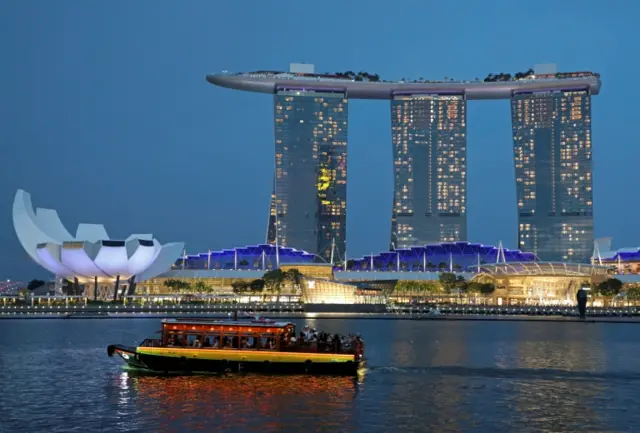 Image source, Reuters
Image source, ReutersThe Welsh government has added Singapore and Cuba to its safe travel list, meaning travellers returning to Wales from either destination will no longer have to self-isolate for 14 days.
In line with the UK government, travellers returning to Wales from Switzerland, the Czech Republic and Jamaica will face quarantine from 0400 on Saturday 29 August, after a spike in infections saw them removed from the UK's established travel corridors, Health Secretary for Wales Vaughan Gething said in a statement.
As Parisians prepare for the mandatory wearing of masks from Friday, France has reached a new record in the number of daily infections since lockdown ended in early May.
An additional 6,111 people were registered as infected with Covid-19 over the past 24 hours, public health body DGS says. Forty-eight people died over the past two days.
Prime Minister Jean Castex has admitted there is an "undeniable resurgence of the epidemic", with a national rate of 39 positive cases per 100,000 people, four times the rate of a month ago.
Mandatory face coverings in some areas - along with an increase in testing - have been introduced to try and stem the spread of the virus.
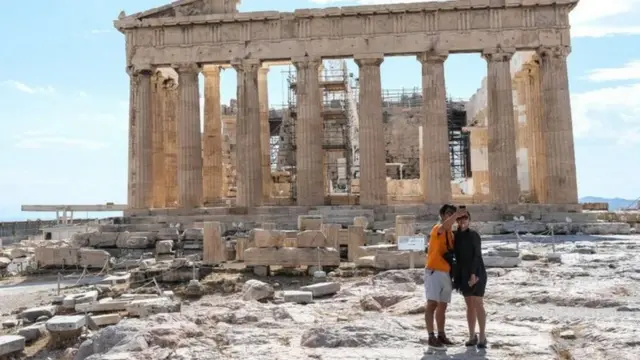 Image source, Getty Images
Image source, Getty ImagesUK travellers heading to Greece do not currently have to quarantine on return
People planning trips abroad face uncertainty, with the ongoing prospect of new countries being added to the UK's quarantine list, often at short notice.
Travellers in Switzerland, Czech Republic and Jamaica are the latest holidaymakers to face unexpected quarantine - anyone arriving in the UK from there after 04:00 BST on Saturday will have to self-isolate for two weeks.
Croatia, Austria, France and Spain have all found themselves on the UK quarantine list over the course of the last six weeks.
So which countries are now subject to UK quarantine measures, what's the criteria for adding or removing countries from the list, and which holiday destinations can you still travel to - at present - without being locked down in your own home for two weeks afterwards?
We have all the answers for you here.
 Nick Triggle
Nick Triggle
Health Correspondent
The number of daily UK cases of coronavirus has risen to 1,522 in the past 24 hours - the highest tally since mid-June.
But this rise needs to be seen in context.
While any increase in cases is worrying, we are now testing more people than we did two months ago.
And it follows that the more you look for the virus, the more you will find it.
The increase in cases since early July - when the average rate was half what it is now - cannot be accounted for alone by more testing, but it is certainly a factor.
The other thing to remember is where we have come from.
At the peak of the pandemic, we were not able to conduct mass testing, so we don't know exactly how many cases there were. But the best estimates suggest there were around 100,000 new infections every day at the end of March.
It is unrealistic to expect cases to fall to zero.
What's important now is that we keep beating down the virus – and limit any increases.
That requires identifying hotspots and keeping a lid on them. All the indications are that the areas that have had extra restrictions imposed on them in recent weeks have seen a declining number of cases.
The national rise - certainly at this point - is not as alarming as it seems. But there can be no room for complacency.
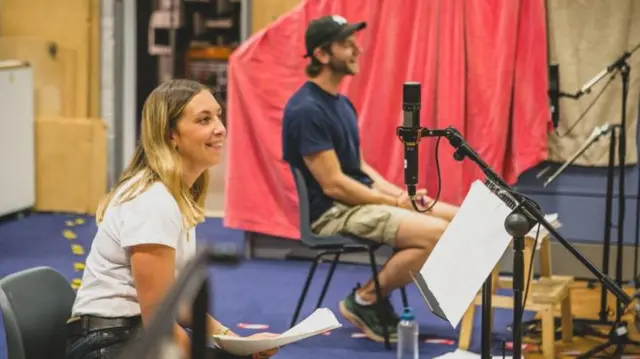
Hollie Chapman and Wilf Scolding, who play Alice and Christopher Carter, were amongst the first actors back in the studio
The cast of BBC Radio 4's The Archers have returned to the recording studio, heralding an end to the series of monologues which some listeners deemed "dreary".
Over the summer, the long-running rural soap featured characters talking to themselves or holding one-way phone conversations, as Covid-19 forced the cast to record scripts at home.
When the episodes debuted in May, some listeners enjoyed the insights into the characters' inner lives but others took umbrage at Ambridge - with one former editor of the show describing it as "tedious".
The complaints prompted an apology from Radio 4's controller, Mohit Bakaya.
"The challenges were tricky for The Archers; I accept totally that some people have not enjoyed the monologues and I'm sorry about that," he told Radio 4's Feedback programme last week.
"We're going to start moving back to The Archers we all know and love and I hope that those people, if there are any who have drifted away, will come back to find The Archers... in fine form."
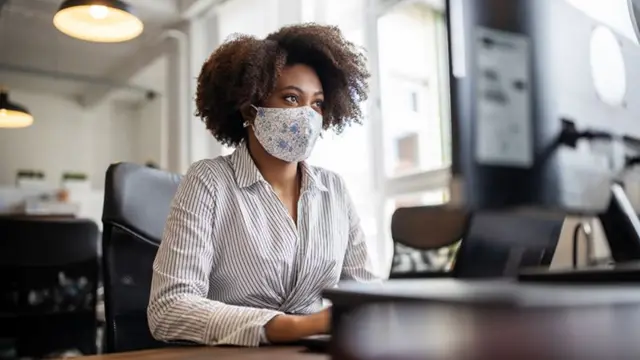 Image source, Getty Images
Image source, Getty ImagesGood ventilation could be the key to avoiding coronavirus as autumn approaches and people spend more time indoors.
For months we've been told to wash our hands and maintain social distancing to beat coronavirus.
But scientists and engineers say we also need to think about the air we breathe, as children go back to school and more people return to offices.
Good ventilation matters in five ways. David Shukman, BBC News science editor, looks at how the air we breathe is bound to be part of any effort to make buildings safer.
German citizens are being urged not to travel to countries and regions where the risk of contracting the coronavirus is high.
"It has turned out that a disproportionately high number of travellers returning (from high-risk areas) tested positive," German Chancellor Angela Merkel said after a meeting with regional ministers on new quarantine rules.
From October, a new digital system will replace paper documents handed out on flights to better track returnees and monitor their quarantine obligations. Those who fail to follow the rules could face substantial fines.
Travellers returning from non-essential travel to high-risk countries may also find they are unable to claim compensation for lost income during self-isolation.
Mandatory testing at airports will continue, Mrs Merkel said, but the 14-day quarantine rule could be shortened if a negative test is provided within five days of landing.
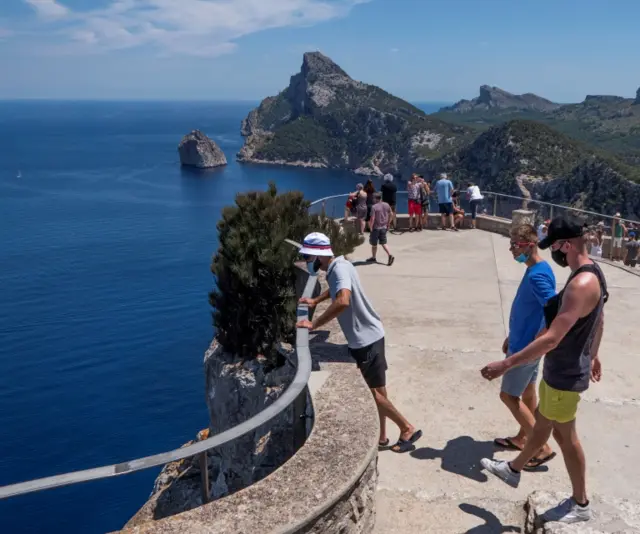 Image source, EPA
Image source, EPAMajorca is a popular tourist destination
Holiday company Jet2 has announced it has cancelled all flights to the Balearic Islands this summer.
The low-cost airline and package operator said it had taken the "difficult decision" to suspend all flights and holidays to Ibiza, Majorca and Menorca because of "ongoing uncertainty" around the pandemic and current UK government advice.
UK travellers visiting Spain or any of the Spanish Islands must currently self-isolate for 14 days upon return, after a spike in coronavirus infections.
Jet2 said customers would be offered a full refund, a credit note or the option to rebook - with Jet2 promising almost 100,000 additional seats to destinations in Greece, Turkey and Portugal.
The company said it remained committed to working with the Balearic Islands, and bookings for summer 2021 were "looking strong".
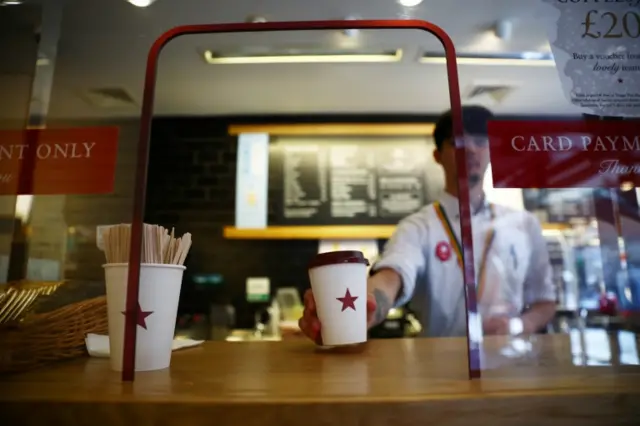 Image source, Reuters
Image source, ReutersSandwich chain Pret a Manger has announced it will cut 2,800 roles from its shops.
Last month, the high street stalwart said it would close 30 stores as part of plans to restructure the business in the wake of the coronavirus pandemic.
Despite "clear signs of recovery" since lockdown measures were eased, Pret said trade across its shops remained around 60% down when compared with last year.
Chief executive officer Pano Christou said he was "gutted" to be losing so many colleagues.
"The pandemic has taken away almost a decade of growth at Pret," he said, adding that the company had altered working patterns to protect as many jobs as they could.
"I'm hopeful we'll be able to review all these changes now that trade is improving again, and I'm encouraged by the improvements we're seeing every week," he added.
From 08:00 on Friday (06:00 GMT), anyone out in public in the French capital will be required to wear a face covering. This will include people on bicycles, motorcycles, scooters and a variety of other mobility vehicles, Paris's mayor has announced.
Individual streets and areas in Paris already had rules on wearing face coverings, but the new rules extend to the city's inner ring of Seine-Saint-Denis, Hauts-de-Seine and Val-de-Marne.
France has seen a surge of Covid-19 cases across the country and Prime Minister Jean Castex has promised to do everything to avoid another widespread lockdown, including increased testing.
Read more here.
Cuba has been added to the UK's list of countries with whom it shares travel corridors, meaning UK tourists holidaying in Cuba will no longer be required to self-isolate for 14 days when they return.
It follows the UK's decision to add Portugal to the safe travel list last weekend.
Transport Secretary Grant Shapps once again reminded UK citizens that they should only travel if they were prepared to unexpectedly quarantine on return.
He tweeted that quarantine was "a legal requirement" and could result in a fine and a criminal record if it was ignored by travellers.
The UK government has announced it is to remove the Czech Republic, Switzerland and Jamaica from the list of travel corridors.
A tweet from Transport Secretary Grant Shapps said those arriving in the UK from any of the three specified destinations after 0400 on Saturday would need to self-isolate for 14 days.
He added that data showed the three countries need to be removed from the list of safe destinations "to keep infection rates down".
Allow X content?
This article contains content provided by X. We ask for your permission before anything is loaded, as they may be using cookies and other technologies. You may want to read X’s cookie policy, external and privacy policy, external before accepting. To view this content choose ‘accept and continue’.
Read more here.
By Richard Warry, Assistant Editor, BBC Health
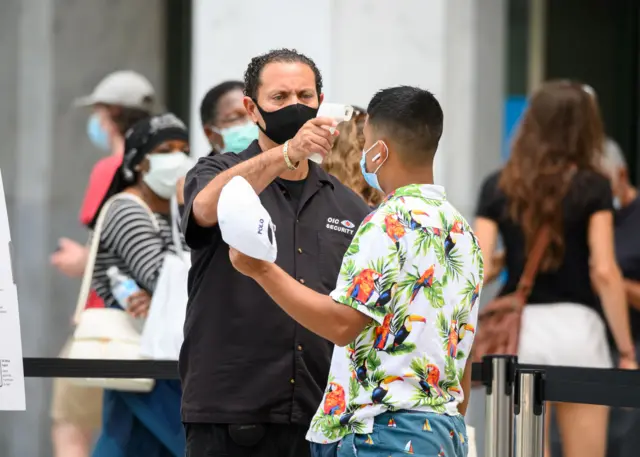 Image source, Getty Images
Image source, Getty ImagesTemperature checks and masks are becoming routine for shoppers
The U-turn by the US Centres for Disease Control and Prevention on Covid-19 testing guidelines has raised eyebrows in the scientific community.
The agency no longer recommends testing for most people without symptoms, even if they have been in close contact with an infected person. Previously it said tests were appropriate for anybody who had reason to believe they had been exposed.
Experts warn that extensive testing is vital to contract tracing efforts, and controlling the spread of the virus. Some studies suggest that about half of all transmission is from people who have yet to develop symptoms.
However, the new guidance is no different to that in place in the UK. Under the NHS test and trace scheme, people who have been in contact with an infected person are advised to self-isolate for 14 days. A test is only deemed necessary if they develop symptoms. The rationale is that a single test will not definitely prove you are clear of the virus if you are in the early stages of infection, so it is better to wait until there is hard evidence that you are falling ill. Health Secretary Matt Hancock has suggested asymptomatic people may be tested later in the year if new rapid turn-around tests come on stream.
The European Centre for Disease Prevention and Control says tests should be considered for people “who have had a high-risk exposure to a confirmed case”. However, it accepts this might not always be feasible, and that in low prevalence settings, it could lead to a higher rate of false positive results, and may not be cost effective.
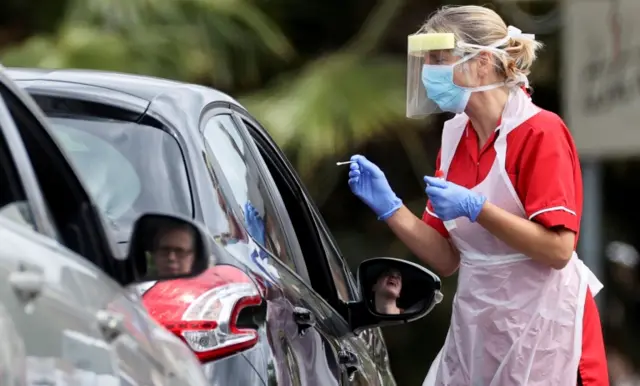 Image source, Reuters
Image source, ReutersThe UK has recorded a further 1,522 new cases of coronavirus in the past 24 hours, external - the highest number since the middle of June, according to figures published by the government.
It marks an increase of nearly 500 cases in one day, up from 1,048 on Wednesday. But the rise comes amid an increase in testing, possibly accounting for greater case numbers.
A further 12 people have died within 28 days of a positive test for coronavirus, taking the death toll in the UK to 41,477.
Separate figures published by the UK's statistics agencies show there have now been a total of 57,200 deaths registered in the UK where Covid-19 was mentioned on the death certificate.
Sean Coughlan
BBC News, education correspondent
When schools around the world were closed by the coronavirus pandemic, it meant families relying on accessing lessons online.
But an international report from Unicef shows that for one in three of the world’s school children, there was no access to any kind of distance learning.
Henrietta Fore, executive director of the UN’s children’s agency, says this has become a “global education emergency” with the long-term exclusion from education likely to damage “economies and societies for decades to come”.
The most acute problem has been in sub-Saharan Africa, where about half of children - about 120 million pupils - have been out of reach of school.
When schools closed, so did access to any kind of lessons - and the report warns the poorest families are most likely to have missed out.
About 1.5 billion children around the world saw schools closed by Covid-19, and now an estimated 463 million have been left without any education to replace it - either because they had no internet access or because their schools had no way of providing online or distance learning.
Anja Nielsen, of Unicef UK, says even before the pandemic the digital divide in access to educational technology was already a “monumental inequity”.
This has now got worse, she says, and much greater efforts must be made to “ensure that all pupils are able to access learning - within and outside the school walls”.
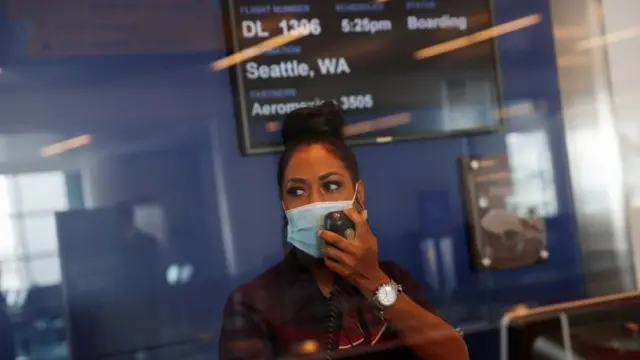 Image source, Reuters
Image source, ReutersIn the US, there's no federal mandate on people wearing masks in airports and on aeroplanes. Instead, it's left up to the airlines to set and enforce their own rules.
Although an airline's gate agents can refuse to allow people to board if they're not wearing a mask, once those passengers are on the plane, there's little cabin crew can do beyond threatening to place them on a list banning them from future travel with that carrier.
US airline Delta has placed about 240 people on one such "no-fly list" for refusing to comply with the company's mandatory mask policy, Chief Executive Ed Bastian said in a memo to employees today.
"Although rare, we continue to put passengers who refuse to follow the required face-covering rules on our no-fly list," he said in the memo seen by Reuters news agency.
One prominent figure to end up on Delta's list was Robert O’Neill, a Navy Seal who was involved in the operation to kill Osama Bin Laden. He posted a selfie last Wednesday while on board a flight to Newark, New Jersey, in which he wasn't wearing a mask.
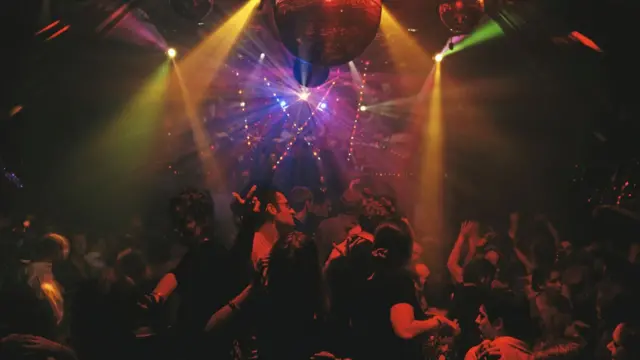 Image source, Getty Images
Image source, Getty ImagesOne of Glasgow's biggest nightclub operators is demanding urgent help to save jobs in the night-time economy.
Donald Macleod, who owns the Garage and Cathouse in the Scottish city, said First Minister Nicola Sturgeon should "let us know if you hate pubs and clubs", as he called for more funding ahead of the winding down of the jobs retention scheme.
"There has been no help coming from the Scottish government to the night-time economy," he said, adding that it had "unfairly" championed "elite" organisations like theatres.
The Scottish government said nightclubs posed a risk because they involved prolonged close contact and it supported the extension of the furlough scheme, which is run by the government in Westminster.